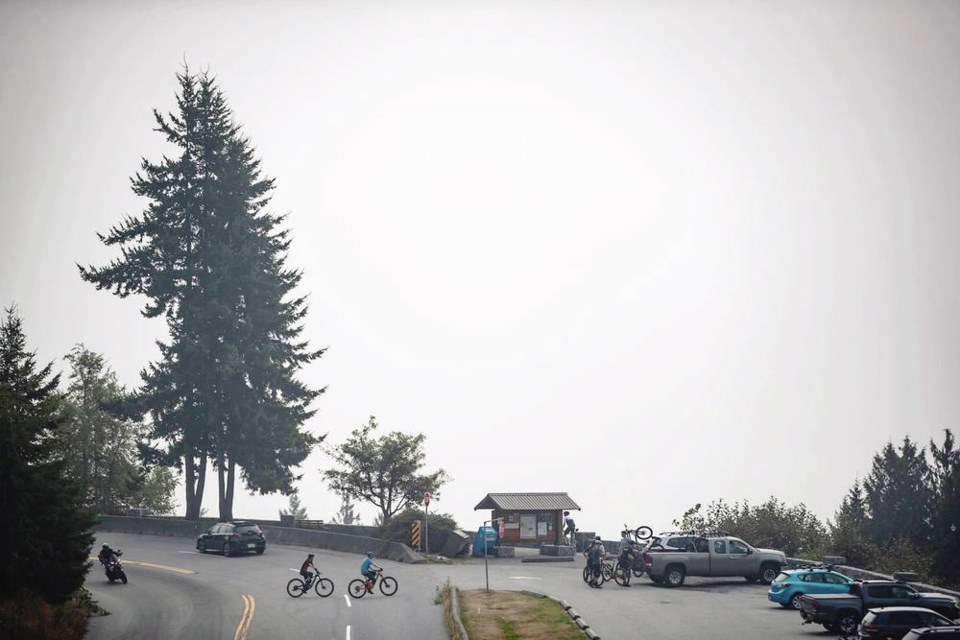The shift in wind that brought to the region smoke from wildfires in Washington and Oregon in recent weeks also brought home firsthand appreciation of what COVID-19 restrictions have meant for people living in the province’s seniors care homes.
For more than a week already this month, wildfire smoke has shrouded the sky, the sun and even views of buildings and vehicles across the street. Environment Canada issued special air quality statements for much of B.C. and advised people with underlying medical conditions or respiratory infections to stay indoors. On a few days, a live air tracker listed Vancouver’s air quality as among the worst in the world, alongside that of Portland and Seattle.
At times, it felt like summer 2017 and 2018 all over again here on the south coast.
But unlike those smoky years, when hundreds of thousands of hectares across the province’s Interior burned, forcing the evacuation of many communities, the current, percolating COVID-19 pandemic compounds the issue.
Even at the most restrictive stage of the pandemic response, when businesses, offices, stores, restaurants and other places where people typically gather closed, most of us could still go outside. Indeed, we were encouraged to do so, and many of us took advantage of the option.
The outdoors had been an escape from dining rooms-turned-home offices, from antsy, frustrated and bored kids, and worried spouses during the pandemic shutdown. When pressure indoors rose, we could escape for a run around the block or a walk in a nearby park. We could herd the kids down the street to the neighbourhood schoolyard to chase a soccer ball for an hour or lead them on a bike ride. Even just heading out to the balcony to drink a quiet cup of coffee or to yard to pull some weeds offered respite.
Those living in seniors’ and critical care homes didn’t have the choice. From March to July, they were confined physically and socially. They couldn’t leave their facilities and were encouraged to remain in their rooms as much as possible. The lucky ones live in residences with rooftop gardens, balconies or garden courtyards, allowing them to spend some time outside alone or carefully distanced from other residents.
Facilities’ social activities ended, and even now opportunities to mingle with fellow residents remain limited.
Now, one designated non-resident family member or friend can now visit their loved ones. The procedures remain carefully managed to prevent outbreaks of COVID-19 among residents and staff.
During the past two weeks, the air quality health index for the region reached higher than 10 on a chart that ranks health risk severity from one, or no risk, to 10, or extreme risk.
In some areas, concentrations of airborne fine particles measured in the hundreds, when values at or below 25 are considered safe. Breathing in the particles can bring them deeply into the lungs, where they can irritate the tissues and cause coughing, sneezing, and shortness of breath. They can affect the lungs’ ability to function and can worsen asthma, chronic bronchitis, heart disease, and lung cancer. Good-quality, well-fitting masks provide some protection from particle pollution but not from the gases in the smoke.
Breathing in wildfire smoke also triggers the cellular reactions in lungs that make people who smoke more vulnerable to infection by the COVID-19 virus.
With all of this, our great outdoors became particularly unhealthy. Environment Canada advised children, the elderly, pregnant women and anyone with a heart condition, lung problems or diabetes to avoid going outdoors. Healthy adults were recommended to postpone strenuous outdoor activities. Anyone who experienced a cough or throat irritation was told to stay inside.
Even Canada Post stopped delivering the mail because of the amount of smoke in the air.
Being outside for any length of time during the recent Big Smoke increased risks for many. And this year, settling into a nearby air-conditioned coffee shop, the local library, or recreation centre for hours at a time was in most cases not possible.
In wildfire season during a pandemic, when the wind blows in the wrong direction, so much we normally take for granted can no longer be assumed.



